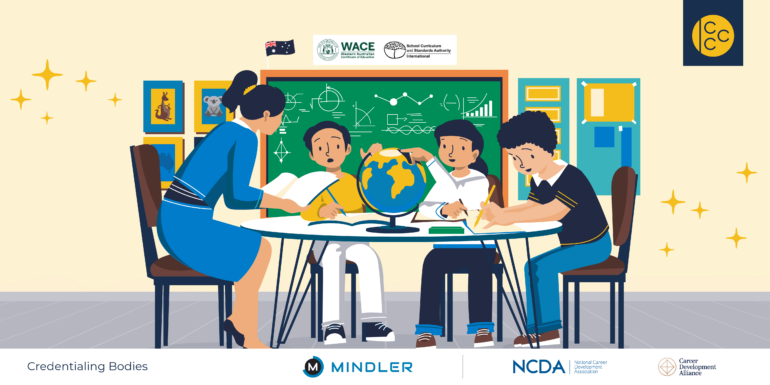What is WACE?
The Western Australian Certificate of Education (WACE) is a globally recognized senior secondary qualification awarded by the School Curriculum and Standards Authority (SCSA), Government of Western Australia. Reporting to the Ministers for Education and International Education, SCSA upholds WACE’s commitment to academic excellence, inquiry-driven teaching, and future-oriented learning—empowering students to become confident, competent, and globally prepared.
Now officially launched in India, WACE is gaining attention as the first government-recognised international curriculum to be introduced in the country in over 25 years. In this blog, we’ll simplify the WACE Board for easier understanding.
WACE Journey
The journey of a student in the WACE board follows the following path:
Pre-Primary to Year 10:
Before students step into the WACE senior years (Years 11–12), the Western Australian education system provides a strong and holistic foundation through its Kindergarten to Year 10 (K–10) curriculum.
The curriculum is structured across eight learning areas:
- English – Language, literature, and communication
- Mathematics – Core numeracy, problem-solving, real-life application
- Science – Inquiry, experimentation, and scientific thinking
- Humanities and Social Sciences (HASS) – History, Geography, Civics, and Economics
- Languages – Introduced progressively from Year 3
- Technologies – Design thinking, digital literacy, and innovation
- The Arts – Visual Arts, Music, Dance, Drama, and Media Arts
- Health & Physical Education (HPE) – Physical well-being and health education
Key Highlights
- Conceptual learning over rote learning
- Achievement standards (A–E scale) help track progress year by year
- Practical assessments, projects, and multi-disciplinary tasks
- Fully aligned with the Australian Early Years Learning Framework and builds up to the Western Australian Certificate of Education (WACE)
- This foundation ensures students develop critical thinking, creativity, collaboration, and communication—skills essential for both life and higher education.
- While the WACE system does not traditionally include a Class 10 board exam, based on input from Indian partner schools, work is currently underway to introduce a Class 10 board exam option for WAIS students in India to ensure smoother transitions for students in Indian states where a 10th board certificate is essential for admissions into Class 11.
Year 11 & 12
This stage is designed to prepare learners for university, vocational training, and careers – offering flexibility, depth, and global recognition. Students in Years 11 and 12 (equivalent to Indian Classes 11 & 12) can choose from a wide range of subjects across three pathways: ATAR, General, and VET (Vocational Education & Training).

Subjects Offered
Students typically select 5–6 subjects, combining core and elective areas based on their chosen pathway:
- English (compulsory across all streams)
- Mathematics (Essential, Applications, Methods, or Specialist)
- Sciences: Physics, Chemistry, Biology, Human Biology, Psychology
- Humanities & Social Sciences: History, Economics, Geography, Politics & Law
- Languages: Mandarin, French, Japanese, and more
- The Arts: Visual Arts, Media Production, Drama
- Technologies: Engineering, Design, Food & Text Production, Digital Tech
- Career and Enterprise / Health Education (depending on the stream)
How Assessment Works
WACE maintains a fair and balanced evaluation system that emphasizes learning, not just exams:

Key Highlights
- Balanced Evaluation – No student is judged on a single exam
- No Stream Lock-ins – Mix & match subjects from Arts, Science, Commerce, and Tech
- University-Ready – Strong academic + career foundation for success in India & abroad
- Affordable Alternative
Why Is WACE a Game-Changer for Indian Students?
Most international boards in India are either privately administered or limited to certain metro cities. WACE is different:
- Government-Certified: WACE is operated directly by the Western Australian government.
- Recognized in India: Approved by the Association of Indian Universities (AIU) – treated as equivalent to Class 10 & 12.
- Global University Acceptance: Recognized by top institutions including Ivy League, Group of Eight (Australia), UK Russell Group, and more.
- NEP 2020-Aligned: Emphasizes skill-based, interdisciplinary, and flexible learning.
Who Should Consider WACE?
WACE is ideal for students who:
- Prefer understanding concepts over memorization
- Want to build a strong foundation for college/university
- Seek international pathways without the steep cost of other international boards
- Thrive in project-based and skill-oriented classrooms
- Aspire for STEM, Arts, or interdisciplinary careers
Where is WACE Available in India?
Starting from the 2025–26 academic year, WACE is launching in pilot campuses across Karnataka, including:
- Two schools in Bengaluru
- One school in Bidar
The roadmap includes 100 schools across India over the next three years, as part of a strategic rollout.
Also Read: Education Boards in India- A Complete Overview
Final Thoughts: Why WACE is Worth Exploring
If you’re a student or parent exploring international options that are globally valid, future-ready, and affordable, WACE offers the perfect middle path.
It brings together:
- The credibility of a government-certified board
- The flexibility of modern, NEP-aligned education
- And the accessibility of world-class universities
Thinking Long-Term?
If you’re in Classes 8–10, this is the perfect time to start exploring:
- WACE-compatible schools
- Subject pathways based on your career goals
- UG planning in India or abroad
Want help choosing the right board or pathway for your future? Let our experts at Mindler guide you every step of the way.








